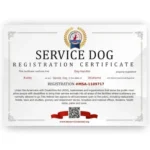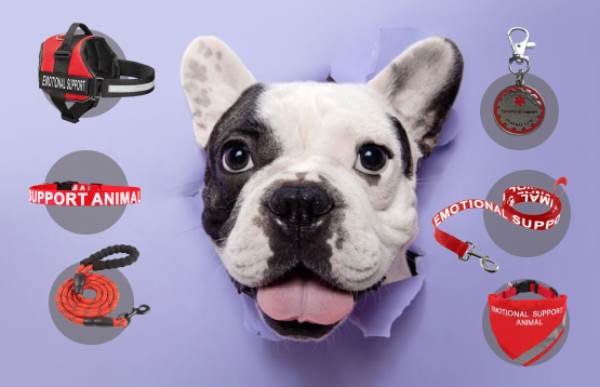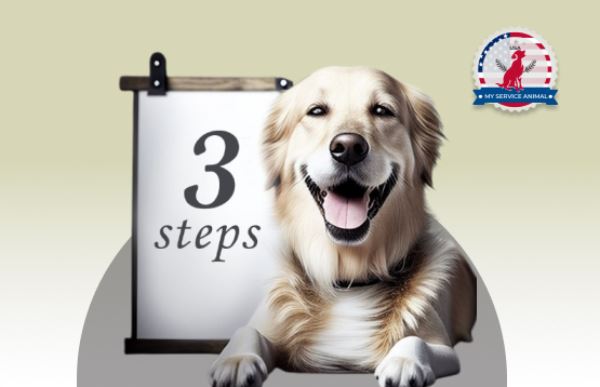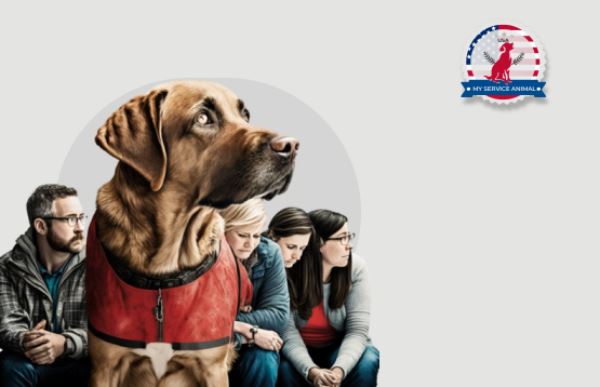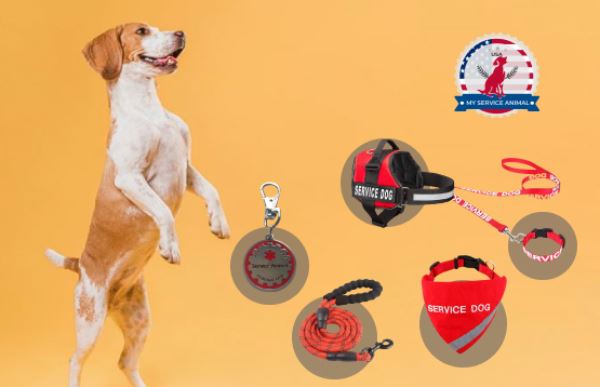Dogs are living with people as pets for hundreds of years now. Various breeds, sizes, and characters. Every dog has its own individual character, and that is why lots of owners see them as their best friends and support. Due to this fact, along with the incredible ability to learn fast, the concept of “service dog” appeared. And, with years, it transformed into a “service animal,” as not only dogs can provide various services and comfort to those who need that.
Besides, not only can dogs help people with disabilities, but also decrease stress, support them emotionally and make them generally much happier. Their services became even more needed during the lockdown and quarantine.
For those who still have some questions on this topic, we have prepared this article. For a better understanding of what service animals can do, what types of support, and who is allowed to get one, keep reading.
How Can the Term “Disability” be Defined?

Due to the Americans with Disabilities Act (ADA) and Division Disability Rights Section, persons with disabilities are those who can’t perform one or more major life activities because of mental or physical impairment. This disability should not be obligatory visible or noticeable. Also, people with a history of disability are protected by the ADA and the U.S Department of Justice as well.
In addition, according to title II and title III of the ADA, a service animal is a dog that is specifically trained to perform any work or task for those who suffer from a disability, including physical, psychiatric, intellectual, or any other mental disability. The types of training are directly related to the person’s issues, and it includes:
- Guide dogs. Those that assist blind people;
- Signal dog (also known as hearing). Trained to help people who are deaf or have significant hearing loss;
- Psychiatric service dog. These dogs are trained to assist people with mental disabilities. That includes reminding handlers to take pills, keeping them away from danger, interrupting self-mutilation, turning off the lights for those with post-traumatic stress disorder, etc.;
- Sensory signal dogs. This type is usually assisting people with autism;
- Seizure response dog. This one is helping people with a seizure disorder. The dog protects the owner during the seizure or can warn them about the seizure episode in advance;
- Dogs to assist people with diabetes. They can warn the person about low or high blood sugar levels.
Under the Department of Justice (Civil Rights Division Disability) and the ADA title II (State and local government services) and III (Public accommodations and commercial facilities), only dogs define as service animals. However, sometimes miniature horses are allowed to assist a person with a disability if they were previously trained to work or perform tasks for this person.
Types of the Helping Animals

Now, we understand the concept of a service dog. However, there are two more types of helping animals: emotional support animals and therapy animals. What is the difference between these three and how to distinguish them – let’s find out.
Service Dog (ADA)
We have already mentioned the definition of a PSD ADA dog. Those are dogs trained to help persons with various kinds of disabilities. Mark that only dogs are legally considered service animals! The tasks they are trained to perform must be directly related to one’s disability. They are not pets, but working animals, and everyone should understand that. When the dog accompanies its handler – it is on duty and should not be distracted.
These animals do not need registration. Moreover, when they are in a public place with the owner, the staff, manager, or employees have no right to demand proof of whether or not the dog is indeed a service animal. If the establishment refused to let a person with a service animal in, it is possible to contact the Department of Justice.
Emotional Support Animals (ESA)
Emotional support animals play the role of moral support and companion. They usually assist people with mental health issues: depression, anxiety attacks, phobias, fears, etc. These animals should not be trained to do work for their owners, however, they must be well-behaved to visit the places of public. Otherwise, the manager can ask you to leave.
Any type of animal can be emotional support: dogs, cats, rabbits, mini pigs, guinea pigs, horses, goats, etc. But what is important, ESAs should always be registered. In order to do this, the owner has to get a letter from the therapist that claims that the patient requires emotional support. And then it is possible to register the pet. The process itself is quick and easy and does not demand a lot of time.
Therapy Animals
Therapy animals are usually dogs that act as moral support for those who need that. Even though they have to be trained in order to be allowed to work with people, therapy animals do not have the same rights as ESA and service animals. Their services are primarily used in such places as hospitals, nursing houses, schools, rehabilitation facilities, etc. It was proved that the animals in such establishments help to decrease the stress level, the feeling of loneliness, and intrusive depressing thoughts. Moreover, these dogs often assist people in socializing. If the dog owner wants their pet to become a therapy dog, they should train them as well as develop social skills. This means that the dog should be comfortable with spending time with various people, have a high tolerance for the physical inconvenience, should not be easily scared, etc.
Are Service Animals and Emotional Support Animals the Same
As we’ve already explained in the previous paragraph, service animals and emotional support animals are not the same. Emotional support animals do not qualify as service animals under the ADA, which is why they do not have the rights that service dog has. Moreover, they have to be registered.
While ESAs play the role of moral support for the person, service dogs are trained to perform tasks for those who are disabled. The skills they are trained to perform usually depend on the person’s disability. For example, they can remind them to take their medicines, warn them about upcoming panic attacks, etc.
Finally, entities covered by the ADA must modify their policies to permit staying in hotels/apartments or visiting public establishments such as cafes, restaurants, etc., with an ADA animal. However, they can refuse to let the person in with an emotional support animal.
Is It Obligatory to Register a Service Dog?
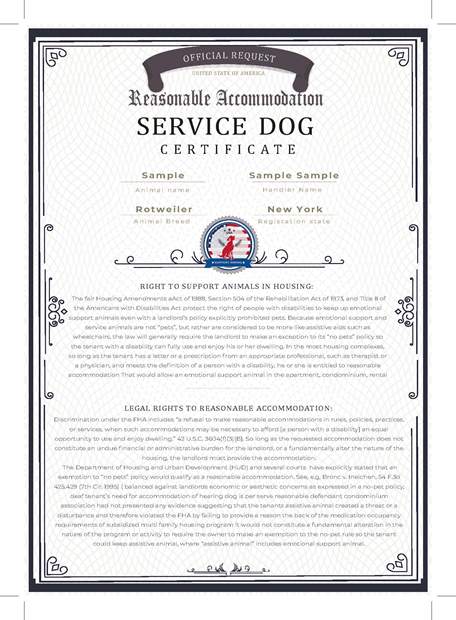
As the ADA rules claim, a service dog must not be registered or have a special certificate. However, some dog owners prefer to have one to prove the dog training was completed and the animal is indeed a service dog. In this way, there will be much fewer questions and uncomfortable situations in the future.
But still, every person with a disability should remember that the employee in any public place (such as a cafe, restaurant, shop, etc.) cannot demand to show this certificate or service dog training license to them. In case of any type of person’s rights violations, it is allowed to call the police or contact the ADA directly.
There is an entirely other situation with ESAs. These animals have to be registered and have proof that their owner needs their services due to mental health issues. Luckily, the registration process does not take a lot of time and effort and can be finished within a week. Please find more about how to register service dogs here.
Service Dog Breeds
There is no such rule that the service animal must be a special breed of a certain type, size, and weight. The most important thing is for them to be individually trained to do tasks for a person with a disability. Moreover, according to the ADA, the miniature horse can also be a service animal.
The manager at public accommodation cannot kick the disabled person out just because their service animal is a specific breed. The only thing that allows them to do this is when the dog is not well-behaved and can be dangerous for the people around. If the manager is personally scared or does not like your dog, you are still allowed at any type of establishment.
In addition, sometimes there are situations when some dog breeds are banned in particular states by federal law. In most cases, these rules are not applied to service animals. The person should discuss it with the local government to receive all the details, as well as needed information.
Mostly, people choose these breeds to be trained as service dogs: Labrador Retrievers, Golden Retrievers, and German Shepherds Dogs. But still, the most important thing is their behavior and character – the dog should be calm, handler-focused, and do not distract easily by the members of the public.
What Animals Can Be Service Animals?
According to the ADA rules, only service mini horses or dog that is individually trained to help with the person’s disability can be a definition of a service animal. They are not pets and cannot be owned by anyone who wants one. These animals have to work or perform tasks for an individual with a disability.
On the other hand, any type of animal can be an emotional support animal. Its primary task is to make the person with a mental disability feel comfortable and safe and distract them during hard times. The type of animal is not important. It can be a dog, cat, guinea pig, miniature pig, horse, rabbit, and so on. But note that ESAs should always be registered and require a note from the therapist about the owner’s issues.
However, if the ESA is an exotic animal, the owner must contact the local government to clarify whether or not they are allowed to keep it at home.
 Do Service Animals Need Any Special Accessories?
Do Service Animals Need Any Special Accessories?
According to the local governments and the ADA, service dogs do not require to wear any accessories that show people they are indeed trained to do work for people with disabilities. However, a lot of handlers prefer to use one to avoid unnecessary questions from the surrounding people.
If the dog has been trained to help those with health issues, they can wear special harnesses, a vest, collars or tags, or their ID. It in no way interferes with legitimate safety requirements. Moreover, if any of the devices mentioned above interfere with the service the dog has been trained to perform, nobody can demand to put them on the dog. In addition, employees in public places cannot require a note that proves an individual’s disability. The two questions they are allowed to ask are “Is the dog a service animal required because of a disability?” and “What work or task has the dog been trained to perform?”.
They are obliged to let the person together with the service dog in without any uncomfortable questions and remarks.
Are Service Animals Allowed in Public Establishments?
As it was already mentioned above, individuals with disabilities are allowed with their helpers if the dog is a service animal. It can follow the handler everywhere, including buffets, self-serving restaurants, cafes, school and university dining rooms, hospitals, workplaces, etc. The only thing that the ADA demands is that dogs must be well-behaved and taught according to the needs of the individual with a disability.
The manager can ask the person with the dog to leave only if the service dog is aggressive and dangerous to other visitors or workers in the establishment or is not under control. Personal dislikes, allergies, or someone’s fear of dogs cannot be a reason to kick out the person with a service dog.
If there is a situation where another visitor of the establishment is allergic to dogs, employees must accommodate both the person with the allergy and a disabled person with a service dog at a comfortable distance, far from one another.
Traveling with a Service Animal
As we have already mentioned, service dogs always follow their owners anywhere they go. It does not matter whether that is a public establishment, a hospital, or a school/university. The same story is with traveling. Those dogs that had service dog training and are well-behaved can accompany their handler in trains, buses, airplanes, and other types of transport.
According to the ADA, as well as Air Carrier Access Act, a service dog can follow individuals with a disability on air travel. However, there are some rules. The dog should sit near the handler during the whole flight or, if its size allows it, between its legs and the front seat. Sometimes, if the service dog is too big, the employees can require to create it. Besides, no additional fees are needed.
The rules for ESAs are a little bit different. Most commonly, the airline will ask the owner to put the animal into the crate. But, if the person that needs emotional support during the flight shows the note from a therapist, staff will have no right to forbid entering with a service dog. The handler can keep it on the knees or in between the legs (as well as service dogs). However, if the person is traveling with an exotic animal, they need to make sure the state they are traveling to allows this animal on their territory. Anyone can get this info from the Department of Transportation.
Hotels and Service Dogs. Are They Allowed?
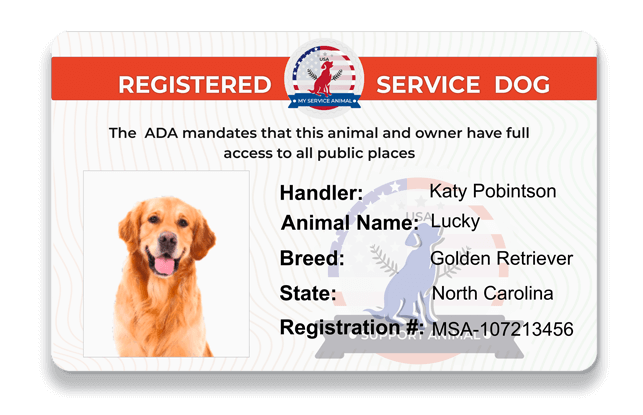
Due to the ADA rules and the U.S. Department Fair Housing Act, hotels or any other rented accommodation cannot prohibit individuals with disabilities from staying in just because of their service dog. Moreover, the dog must always stay with the owner and cannot be isolated from them in the special “pet-friendly areas.” The employees at the hotel are not required to provide care for or supervise a service animal. At the same time, they cannot charge the person more because the dog’s presence “demands more work than without it.” The only situation where the accommodation can demand money is when the service dog caused any type of damage at the place it was staying in.
In the case of emotional support animals, the owner needs to have a note from a therapist and a registration certificate with them. However, hotels still have a right not to let the dog in the building’s public territory.
Final Word
As you can see, dogs (and other types of animals) are not only people’s best friends but also a great help in case of various health issues. Sometimes there are situations that only show that society is not entirely ready for this and may react inadequately to the person with a service animal. In this case, the main thing is to explain everything calmly.
Hopefully, the presence of a service dog or ESA will be absolutely normal in the surroundings soon. But for now, we are trying to explain everything in as detail as possible and help people with all the information that they may need. That is all for today. Thank you for reading, and stay safe!
 Do Service Animals Need Any Special Accessories?
Do Service Animals Need Any Special Accessories?








